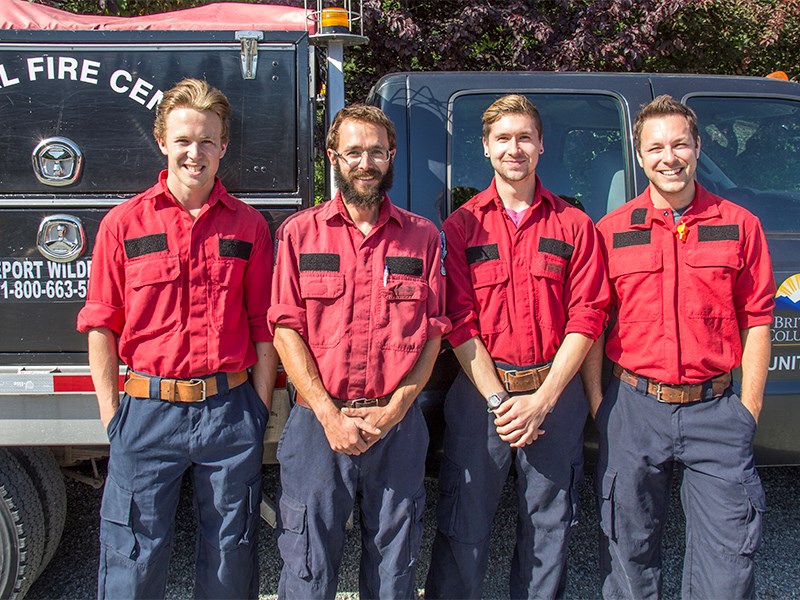While no forest fires have been reported in the Powell River region so far this summer, BC Wildfire Service Initial Attack crews have been placed on maximum standby, according to Coastal Fire Centre fire information officer Donna MacPherson.
MacPherson said BC Wildfire Service is prepared for any outbreaks, including in Powell River. Sufficient resources are available in the area to respond immediately, she added.
While more than 240 wildfires burn throughout the province, the coast has been spared so far.
“It’s been eerily quiet compared to what’s going on in the rest of the province,” said MacPherson.
Initial Attack crews are three-member first responders to fires that hit hard and fast.
“The job is to catch small fires before they get big,” said Powell River Initial Attack crew leader Mark Albert. “We are highly versatile.”
Albert’s team consists of members Greg Blais, Eric Scott and student-intern David Rupf.
The team’s versatility allows it to shift tasks and priorities, sometimes having to turn on a dime.
“We can be headed to Williams Lake and halfway down to the ferry they can say, ‘Turn around, you’re going to Toba Inlet,’” said Albert. “That’s the world we live in.”
The Powell River zone is never unattended. If the local Initial Attack crew is deployed elsewhere in the province, or anywhere in Canada, two crews in Sechelt and three in Campbell River can be transported to the area by helicopter in about 15 minutes.
“They are highly maneuverable people trained on how to get out of an aircraft without the aircraft touching the ground,” said MacPherson. “Because we have such mountainous terrain here on the coast, they may be required to do that.”
When a small fire becomes bigger, Initial Attack crews make way for larger unit crews with 20 members.
“Those are the bigger ones,” said MacPherson. “They’re normally deployed by ground only and they go to the big fires because you need that horsepower to get out there.”
According to Blais, unit crews are currently battling the fires in the interior.
“I’m really happy no bad incidents have happened in the interior right now,” said Blais, “because there are so many fires and they’re so big.”
Blais has been with the fire service for three years and knows the dangers of the job well. He experienced his first fire in May 2015.
“We had to go down a gully to fight the fire from below,” said Blais. “It was around 3 pm and things started heating up; humidity goes down and things flash quickly. The fire was coming faster than I was expecting, so it shook me because I wasn’t expecting it.”
Powell River is within the coastal fire region, which comprises an area of 16.5 million hectares and the highest population density in the province.
The vast area has a high potential for fires that could affect homes, cabins, watersheds, communication towers, transmission lines, roads and other infrastructure. Coastal Fire Centre headquarters is located in Parksville.
If anyone sees a column of smoke, MacPherson said they should call Coastal Fire Centre at 1.800.663.5555 or *5555 on mobile phones.
“The sooner we can get there,” she said, “the better.”



